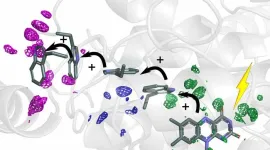(Press-News.org) Cells need energy to function. Researchers at the University of Gothenburg can now explain how energy is guided in the cell by small atomic movements to reach its destination in the protein. Imitating these structural changes of the proteins could lead to more efficient solar cells in the future.
The sun’s rays are the basis for all the energy that creates life on Earth. Photosynthesis in plants is a prime example, where solar energy is needed for the plant to grow. Special proteins absorb the sun’s rays, and the energy is transported as electrons inside the protein, in a process called charge transfer. In a new study, researchers show how proteins deform to create efficient transport routes for the charges.
Guided electrons
“We studied a protein, photolyase, in the fruit fly, whose function is to repair damaged DNA. The DNA repair is powered by solar energy, which is transported in the form of electrons along a chain of four tryptophans (amino acids). The interesting discovery is that the surrounding protein structure was reshaped in a very specific way to guide the electrons along the chain,” explains Sebastian Westenhoff, Professor of Biophysical Chemistry.
The researchers noted how the changes in the structure followed precise timings in line with the transfer of the charge – important knowledge that could be used to design better solar panels, batteries or other applications that require energy transport.
Better able to imitate nature
“Evolution is nature’s material development and it is always the best. What we have done is basic research. The more we understand about what happens when proteins absorb sunlight, the better we can imitate this conversion of solar energy into electricity,” says Sebastian Westenhoff.
The study, published in Nature Chemistry, is a clear step forward in the research on charge transfer in proteins. Studying the process in the fruit fly, using the Serial Femtosecond Crystallography (SFX) technique, can give researchers an insight into the dynamic interaction of the protein as the electrons move.
“This is going to open up new chapters in our understanding of life’s mysteries at the molecular level,” concludes Sebastian Westenhoff.
END
Proteins guide electrons to the right place
2024-02-15
ELSE PRESS RELEASES FROM THIS DATE:
Language and culture may influence how our brain processes emotional faces
2024-02-15
Body language and the understanding thereof is a crucial part of communication. It is often assumed that humans can innately recognize other’s emotions, but there is growing evidence that the ability to decipher these emotions is not instinctive but shaped by people’s culturally shared understanding of emotions.
A team of scientists in the US decided to investigate how cultural upbringing and access to emotion category words, which categorize and facilitate access to a complex set of emotional ideas, experiences, and responses ...
New peer-reviewed EWG study finds little-known toxic crop chemical in four out of five people tested
2024-02-15
WASHINGTON – A new Environmental Working Group peer-reviewed study has found chlormequat, a little-known pesticide, in four out of five people tested. Because the chemical is linked to reproductive and developmental problems in animal studies, the findings suggest the potential for similar harm to humans.
EWG’s research, published February 15 in the Journal of Exposure Science and Environmental Epidemiology, tested the urine of 96 people for the presence of chlormequat, finding it in 77 of them. EWG summarized the findings in an article published on its website.
“EWG’s new study on chlormequat ...
Antidepressant use lower in moms who have support from grandparents
2024-02-15
Mothers are less likely to take antidepressants if their own parents and parents-in-law are healthy and live close by– a new study finds.
On the flip side of the coin, antidepressant use was highest in mothers whose parents and parents-in-law were elderly, in poor health, and lived far away – possibly due to the stress caused by needing to care for and support older grandparents instead of receiving help from them.
The findings of this new longitudinal study which tracked 488,000 mothers of young children between 2000-2014 are published today in the peer-reviewed journal Population Studies.
“Previous studies have consistently shown that younger grandparents in good ...
Experts call for innovative strategies to address global blood crisis, form blood D.E.S.E.R.T coalition
2024-02-15
KEY TAKEAWAYS
The majority of the world’s people live in what are known as “blood deserts,” areas in which the clinical need for blood components cannot be met in at least 75% of cases.
A global coalition of experts led by researchers from the Brigham identified urgent steps that can be taken by health systems to improve access to blood until longer term strategies are established
Billions of people live in parts of the world that are so remote from the nearest hospital facility with a functioning blood bank that they are termed “blood deserts.” Researchers from Brigham and Women’s Hospital, a founding member of the ...
Walking, jogging, yoga and strength training ease depression
2024-02-15
Walking or jogging, yoga, and strength training seem to be the most effective exercises to ease depression, either alone or alongside established treatments such as psychotherapy and drugs, suggests an evidence review published by The BMJ today.
Even low intensity activities such as walking or yoga are beneficial, but the results suggest that the more vigorous the activity, the greater the benefits are likely to be.
The authors stress that confidence in many of the findings remains low ...
Doctors quitting over stress and cost of finding suitable childcare
2024-02-15
Securing suitable childcare for the irregular and long working hours demanded by a medical career is a crippling financial burden and a draining source of stress for doctor parents, reveals an exclusive snapshot survey by The BMJ today.
Some doctors have resigned or are considering resigning, others have changed specialities in the hope that it gives them more flexibility, and yet more altered their plans to have children as a result, reports health journalist Erin Dean.
The BMJ Childcare Survey ran on bmj.com from 16 to 30 November ...
Companies are adopting feminist narratives to influence women’s health
2024-02-15
Feminist health narratives are being co-opted by commercial interests to market new technologies, tests, and treatments that are not backed by evidence, argue researchers in The BMJ today.
Dr Tessa Copp at The University of Sydney and colleagues say such marketing behaviour risks harming women through inappropriate medicalisation, overdiagnosis, and overtreatment.
They call for greater wariness of simplistic health messages that any knowledge is power, and urge health professionals and governments ...
The BMJ reveals huge delays in dealing with complaints against UK drug companies
2024-02-15
Processing times for complaints against drug companies suspected of having breached their industry code of practice have more than tripled in a nearly two-decade period, an investigation by The BMJ has found.
Data analysis by Shai Mulinari at Lund University and Piotr Ozieranski at the University of Bath show that the average processing time of a complaint more than tripled between 2004-2021, from less than three months to more than 8.5 months. Numerous complaints have taken more than a year ...
School uniform policies linked to students getting less exercise, study finds
2024-02-15
School uniform policies could be restricting young people from being active, particularly primary school-aged girls, new research suggests.
The University of Cambridge study used data about the physical activity participation of more than a million five-to-17-year-olds internationally. It found that in countries where a majority of schools require students to wear uniforms fewer young people tend to meet the 60 minutes of physical activity per day recommended by the World Health Organisation (WHO).
Regardless of uniform policies, across most countries fewer girls than boys reach those ...
Scientists are unravelling the secrets of red and grey squirrel competition
2024-02-15
In a first of its kind study, researchers have identified significant differences between the diversity of gut bacteria in grey squirrels compared to red squirrels which could hold the key to further understanding the ability of grey squirrels to outcompete red squirrels in the UK.
New research, published in the Journal of Medical Microbiology, looked to understand more about the mechanisms by which grey squirrels are able to gain an advantage over red squirrels. Chris Nichols, Conservation Evidence ...

